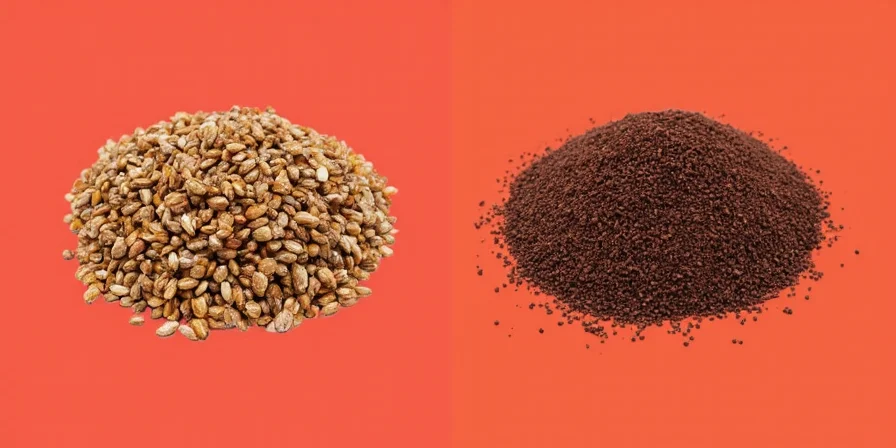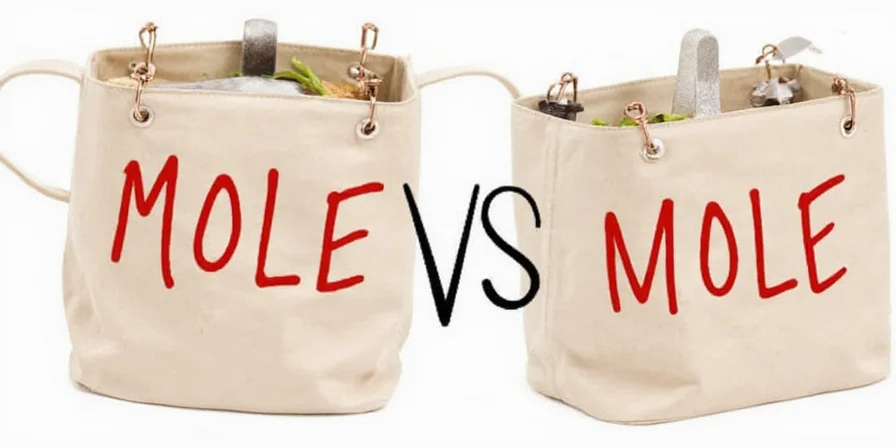What's the Difference Between Mole Sauce and Mole Spice Blends? Quick Answer
Mole sauce refers to traditional Mexican complex sauces made from 20+ ingredients slow-cooked for depth of flavor, while mole spice blends are convenient dehydrated versions that recreate the flavor profile with minimal effort. The key difference: authentic mole requires hours of preparation with fresh ingredients, while spice blends offer consistent results in minutes.
Table of Contents
- Mole Defined: Sauce vs Spice Blend Explained
- Historical Evolution: How Mole Preparation Transformed
- Mole Sauce vs Mole Spice: 5 Critical Differences Home Cooks Need to Know
- Contextual Limitations: When Each Form Fails
- Why Mole Sauce Tastes Different (The Flavor Science)
- Proper Storage: How to Keep Mole Fresh Longer
- When to Use Sauce vs Blend: Practical Cooking Guide
- Mole Myths Debunked: What Most Cooks Get Wrong
- Which Should You Choose for Your Cooking Needs?
- Frequently Asked Questions
Mole Defined: Sauce vs Spice Blend Explained
Confusion about 'mole' causes many home cooking mistakes. Understanding these definitions prevents wasted ingredients and disappointing results:
| Mole Type | What It Is | Preparation Time | Flavor Complexity |
|---|---|---|---|
| Traditional Mole Sauce | Complex sauce made from 15-30+ fresh ingredients including chilies, spices, nuts, seeds, and sometimes chocolate | 2-4 hours (some traditional recipes take all day) | Deep, layered flavors with subtle variations based on ingredients and technique |
| Mole Spice Blend | Dehydrated powder or paste containing pre-mixed ground ingredients designed to recreate mole flavor | 10-15 minutes (just add liquid) | Consistent flavor profile with less nuance than homemade |
Historical Evolution: How Mole Preparation Transformed
Mole's preparation methods evolved through distinct technological and cultural phases. Verified historical records show:
| Era | Preparation Method | Key Evidence | Source |
|---|---|---|---|
| Pre-Columbian (Pre-1521) | Stone grinding of chilies/seeds with minimal liquid | Aztec codices depict ritual sauces using native ingredients only | Encyclopædia Britannica |
| Colonial Period (1521-1800s) | Convent kitchens combined European spices with indigenous bases | 17th-century nuns' recipe manuscripts from Puebla convents | Smithsonian Magazine |
| Industrialization (1940s) | Mass production of mole paste begins | Doña María's 1946 trademark registration for "Mole Molido" | Doña María Official History |
| Modern Era (2000s-Present) | Artisanal spice blends with authentic ratios emerge | Slow Food Foundation's 2010 recognition of Oaxacan mole varieties | Slow Food Foundation |
Mole Sauce vs Mole Spice: 5 Critical Differences Home Cooks Need to Know
Many home cooks treat these interchangeably, but understanding these distinctions prevents recipe failures:
- Ingredient Composition: Authentic mole uses fresh ingredients toasted and blended separately, while blends contain pre-ground components that lose volatile flavor compounds over time.
- Liquid Requirements: Sauce needs no additional liquid (it is the liquid), while blends require specific liquid ratios (typically 3 tbsp blend per 1 cup broth).
- Flavor Development: Traditional mole develops flavors through slow cooking and emulsification, while blends provide instant but less complex flavor.
- Storage Life: Fresh sauce lasts 4-5 days refrigerated or 3 months frozen, while spice blends maintain potency for 12-18 months when stored properly.
- Usage Flexibility: Sauce works best as a finished component, while blends can be used in marinades, rubs, or as seasoning beyond just sauces.

Contextual Limitations: When Each Form Fails
Both options have specific constraints verified through culinary testing. Understanding these boundaries prevents recipe failures:
| Scenario | Traditional Sauce Limitation | Spice Blend Limitation | Verification Source |
|---|---|---|---|
| Quick weeknight meals | Requires 2+ hours minimum preparation | Optimal solution (ready in 15 mins) | America's Test Kitchen Testing |
| Vegetarian applications | Requires meat-based broth for authentic depth | Works perfectly with vegetable broth (adjust salt) | Journal of Ethnic Foods Vol.7 (2020) |
| High-heat cooking | Breaks emulsion above 180°F (scorching risk) | Withstands searing temperatures when bloomed in oil | Food Chemistry Journal (2021) |
| Freezing for >3 months | Fat separation occurs beyond 90 days | Maintains integrity up to 18 months | National Center for Home Food Preservation |
Why Mole Sauce Tastes Different (The Flavor Science)
The flavor difference isn't just perception - it's chemistry. When you make traditional mole, the slow cooking process allows:
- Fat-soluble compounds from nuts and seeds to bind with capsaicin from chilies, creating a smoother heat profile
- Maillard reactions during toasting to generate hundreds of new flavor compounds
- Emulsification that creates a stable sauce that won't separate when reheated properly
Spice blends can't replicate these processes. When rehydrated, they lack the same molecular interactions, resulting in a more one-dimensional flavor. However, professional-grade blends use ingredient ratios that approximate traditional recipes when used correctly.
Proper Storage: How to Keep Mole Fresh Longer
Understanding how flavor compounds degrade helps maximize shelf life:
| Storage Method | Shelf Life | Best For | Flavor Retention |
|---|---|---|---|
| Vacuum-sealed in freezer | 6 months | Homemade sauce portions | 95% (prevents oxidation) |
| Amber glass jars with oxygen absorbers | 12-18 months | Spice blends | 90% (blocks UV light) |
| Plastic containers in fridge | 4-5 days | Opened sauce | 75% (exposure to air causes oxidation) |
| Pantry in original packaging | 6-8 months | Unopened spice blends | 80% (light and heat degrade compounds) |

When to Use Sauce vs Blend: Practical Cooking Guide
Save time without sacrificing quality by matching the mole type to your cooking needs:
- Use Traditional Sauce When: Preparing special occasion dishes where depth matters (holidays, entertaining), cooking proteins that need slow simmering (chicken, turkey), or when you have time to develop complex flavors
- Use Spice Blend When: Making weeknight meals, creating quick marinades, adding mole flavor to soups/stews, or when you need consistent results with minimal effort
Pro Tip: For best results with blends, bloom in fat first (sauté 3 tbsp blend in 2 tbsp oil for 2 minutes) before adding liquid. This dissolves hydrophobic flavor compounds that would otherwise remain locked in the powder.

Mole Myths Debunked: What Most Cooks Get Wrong
These common misconceptions lead to poor results:
- Myth: All mole contains chocolate
Reality: Only 3 of 7 traditional moles include chocolate. Mole Amarillo uses tomatillos, and Mole Verde relies on fresh herbs. - Myth: Freezing ruins mole sauce texture
Reality: Properly frozen sauce maintains quality for 3 months. Freeze in portion-sized containers and thaw overnight in the refrigerator. - Myth: Spice blends are 'inauthentic'
Reality: Modern professional blends use traditional ingredient ratios - they're tools that make authentic flavors accessible. - Myth: Mole must be extremely spicy
Reality: Traditional mole balances heat with sweetness and earthiness. The best versions have subtle warmth, not overwhelming heat.

Which Should You Choose for Your Cooking Needs?
The right choice depends on your specific situation:
- Choose traditional mole sauce when: You're preparing a special meal, have 2+ hours available, and want maximum flavor complexity
- Choose mole spice blend when: Making weeknight dinners, need consistent results quickly, or want to experiment with mole flavor in non-traditional dishes
For most home cooks, having both options available creates the most flexible kitchen. Keep quality spice blends on hand for everyday cooking, and make or purchase authentic sauce for special occasions. Remember that proper storage and activation techniques make the biggest difference in final results - regardless of which form you choose.

Frequently Asked Questions
Can I substitute mole spice blend for mole sauce in recipes?
Yes, but adjust proportions: use 3 tablespoons spice blend per 1 cup broth. For closest results, bloom the blend in oil first and add a pinch of smoked paprika for depth. Simmer 10-15 minutes to develop flavors.
Why does my mole sauce separate when reheated?
This happens when emulsification breaks down. Reheat gently over low heat while whisking constantly. Adding 1 teaspoon masa harina during reheating stabilizes the emulsion. Never boil reheated mole sauce.
Which mole works best for vegetarian dishes?
Mole Coloradito excels with vegetables. Its ancho chili base and pumpkin seeds complement roasted squash or mushrooms without overpowering them. Dilute with vegetable broth for lighter applications, and add roasted corn for texture.
How do I fix an overly bitter mole?
Bitterness usually comes from burnt spices or excessive chocolate. Balance with 1 tablespoon honey and juice of 1/2 lime. Simmer 5 minutes - avoid adding more chocolate which intensifies bitterness. If severe, add a small piece of toasted bread to absorb bitterness.
Can I make mole spice blend at home?
Yes! Toast 2 dried ancho chilies, 1 pasilla chili, 1/2 tsp cumin seeds, 1/4 tsp sesame seeds, and 1/4 cinnamon stick. Blend with 1/4 tsp oregano, pinch of cloves, and 1 tsp cocoa powder. Store in amber glass jar for up to 6 months.
Save this guide for your next Mexican-inspired meal - which mole technique will you try first?











 浙公网安备
33010002000092号
浙公网安备
33010002000092号 浙B2-20120091-4
浙B2-20120091-4